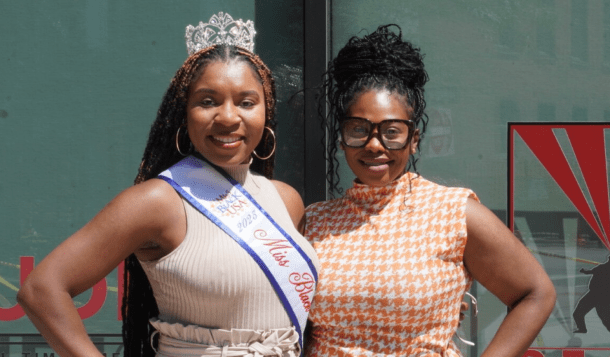By Ebony JJ Curry | Michigan Chronicle | Word In Black
This post was originally published on Michigan Chronicle

(WIB) – The Miss America pageant of 1921 inaugurated what would be a long journey toward inclusivity in the world of beauty. It took nearly five decades before Black women were permitted to participate. The earlier absence was not merely an oversight; it was an explicit institutional stance. The pageant rules in the 1930s blatantly stated contestants must be “of the white race.” Such a rule spoke volumes of the era’s societal biases and stark segregation.
But where there is oppression, there is resistance. This resistance gave birth to the Miss Black America pageant in 1968. More than a mere pageant, it was a loud, defiant proclamation that Black is beautiful, established as a direct counter to Miss America’s exclusionary practices. This wasn’t the beginning of Black beauty pageants —community-based competitions had been held for Black women due to segregation laws. Yet, Miss Black America’s establishment was a monumental stride, a national stage to spotlight Black beauty and talent.
“I want to show young people that even though they still have these European standards, you can still break those standards by actively participating,” said Detroit native and Miss Black Michigan Myya Jones. “With Miss Black USA reigning supreme as a Black pageant that truly cares about Black people, we must use that to progress our people beyond beauty standards.”
The Miss Black Michigan title, a regional testament to the spirit and dynamism of Black women, has, in 2023, found its embodiment in the remarkable Jones. Born and raised in Detroit, Jones is no stranger to breaking barriers and shattering expectations.
Her journey, from being a two-time mayoral candidate to advocating for civic engagement, speaks volumes of her tenacity and commitment to her community. With the Miss Black Michigan crown perched upon her head, she’s not just representing the state’s beauty but its heart, courage, and drive. In a city known for its relentless spirit, Jones stands as a reflection of Detroit’s resilience, marrying politics, philanthropy, and pageantry. Her tenure as Miss Black Michigan isn’t just about holding a title; it’s a renewed pledge to serve, inspire, and uplift.
The Miss Black Michigan pageant, an esteemed branch of the larger Miss Black USA family, has long been a platform where the beauty, intellect, and power of Black women from Michigan are showcased and celebrated. Birthed from a pressing need to recognize the unique experiences, challenges, and triumphs of Black women in the region, the pageant has stood as a pillar of empowerment since its inception.
Throughout its illustrious history, it has consistently promoted not only the physical beauty of its contestants but their intellectual prowess, cultural awareness, and commitment to community service. It has been an arena where young Black women have reclaimed their narratives, battling societal prejudices, and pushing back against Eurocentric beauty standards. By spotlighting talents from diverse fields, be it politics, arts, sciences, or philanthropy, Miss Black Michigan has time and again proven that the strength and essence of Black women are multi-dimensional, and their impact on society is immeasurable.
While the creation of Black-focused pageants was vital, many Black women also sought recognition and representation within mainstream pageantry. Their tenacity bore fruit in 1970 when Cheryl Browne broke the racial barriers of Miss America. This was followed by Vanessa Williams’ iconic win in 1984.
Meanwhile, other mainstream pageants were experiencing their own reckonings. Miss USA, inaugurated in 1952, did not see a Black titleholder until 1990 with Carole Gist’s groundbreaking win. The Miss Universe pageant crowned Janelle Commissiong in 1977, making her the first Black Miss Universe.
The Miss Black USA Pageant stands as a beacon of empowerment, carving out an essential space to uplift and recognize Black women in a world where beauty standards have long been dominated by Eurocentric ideals.
Yet even these victories were fraught with tensions. Jennifer Hosten’s win as the first Black Miss World in 1970 was overshadowed by controversy, as the pageant allowed apartheid South Africa to send two contestants – one Black and one White.
One could argue that 2019 was a tipping point. Black women simultaneously held titles in Miss USA, Miss America, Miss Teen USA, and Miss Universe. It was not just a win for these individuals, but a testament to the relentless endeavors of generations of Black women who refused to be sidelined.
However, mere representation does not imply the eradication of deeply rooted prejudices. This was evident when Abena Appiah, representing the US at the Miss Grand International pageant in 2020, showcased victims of police brutality on her gown. The message was clear: visibility in pageantry doesn’t shield Black women from societal injustices.
Amidst the legacy of Black women in pageantry emerges the Miss Black USA pageant. Established in 1986, it serves dual purposes. Firstly, it’s a platform recognizing the multifaceted beauty of Black women. Secondly, it’s a scholarship program, assisting Black women in achieving higher education. More than a beauty pageant, Miss Black USA disrupts the Eurocentric standards embedded in traditional pageantry.
The Miss Black USA Pageant stands as a beacon of empowerment, carving out an essential space to uplift and recognize Black women in a world where beauty standards have long been dominated by Eurocentric ideals. Its inception was not just to spotlight Black beauty but to break barriers and redefine what society understood as quintessential beauty.
Beyond aesthetics, the pageant serves as a vital platform, advocating for the education and mental well-being of Black women. The scholarship program, a cornerstone of the pageant, underscores its commitment to fostering educational opportunities for Black women, helping them achieve their academic aspirations. Year after year, the pageant magnifies the multifaceted nature of Black women, highlighting their talents, intellect, cultural pride, and community service. In doing so, Miss Black USA has grown into more than just a beauty pageant; it is a movement, a statement, and a celebration of Black excellence, leadership, and resilience.
It’s here that Jones shines. A two-time mayoral candidate with a dedication to community service, Jones is a testament to the multidimensional nature of pageant participants. As Miss Black Michigan, she not only represented her state but also stood as an emblem of leadership, advocacy, and resilience. Beyond the crown and sash, Jones founded Do Good Detroit, further merging her world of pageantry with community activism. Her participation in the Miss Black USA pageant wasn’t just a personal endeavor; it was a representation of every Black girl from Detroit and beyond.
“It was very important for me to compete in Miss Black USA because there is a lot of stigmas still with the pageant industry,” Jones said. “They’re still looking for the naturally thin tall girls and I’m not neither naturally thin or tall I’m a Black woman with full curves, Black nostrils, and all of the fabulous features that we do have.”
When asked, “Why focus on a pageant world that has long overlooked us, especially when the Black community has carved out its own niche?” Jones responded with genuine depth and emotion.
“I feel like every place has a purpose and how you utilize that space, and that place is up to you. You see, I want to run for Senator one day so, with the Miss Black Michigan pageant I was able to meet so many women across the state and now they can say that ‘Myya really cares about politics, we met her, we know her and we’re going to advocate for her in our communities when she decides to run for Senator.’
“With Miss Black USA, I met all of these phenomenal Black women who live in some of the most populated Black cities in America. As you know, the Black women vote has won presidential elections so if I decide to run for president one day, I know all of these Black women across the country who can really rally behind me. So, again it’s all about pushing my platform and how I can use this for my future, myself, the progression of Black people, and my community overall.”
In understanding the legacy of Black women in pageantry, it’s crucial to acknowledge their dual battle. On one hand, they sought representation in an industry that often deemed them invisible. On the other, they consistently used their platforms to challenge and change societal norms. From Miss Black America to Myya Jones, the journey of Black women in pageantry is a captivating tale of resistance, revolution, and resilience.



